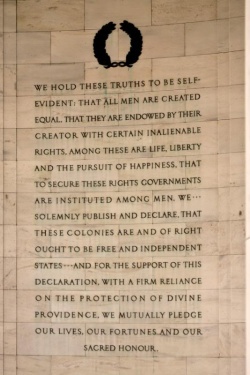Difference between revisions of "Portal:Inalienable Rights"
m |
|||
| Line 5: | Line 5: | ||
<tr> | <tr> | ||
<td style="padding:5px;"> | <td style="padding:5px;"> | ||
| − | The | + | The proper function of government is to preserve the liberty of the society of people that create it. Among the legitimate means of doing that are the encoding of laws - which can be thought of as the 'science of liberty'. Our first set of laws was the Constitution of the United States. |
| − | This concept of such rights | + | The phrase 'inalienable rights' was likely first used in 1725<ref name="Hutcheson">Francis Hutcheson, ''Inquiry into the Original of Our Ideas of Beauty and Virtue'', 1725</ref><ref> Hutcheson foreshadowed the Declaration of Independence, stating: “For wherever any Invasion is made upon unalienable Rights, there must arise either a perfect, or external Right to Resistance. . . . Unalienable Rights are essential Limitations in all Governments.” </ref>. It is synonymous with 'natural rights' and 'God given rights' "Inalienable" means that such rights are immutable - their existence is unconditional. They can neither be given up by the individual or removed by another. They can, of course, be violated. |
| + | |||
| + | This concept of such rights is the foundation of the rule of law - which is the foundation of our government. Rule of Law is the foundation of all truly successful governments. England was first to rely on it through its Common Law. Then America developed it further and placed it at the center of the new government for the United States. Though both have at times strayed, these governments were set up as guardians of these fundamental rights and the people to whom they belong. | ||
This portal is the place to assign categories and articless that present and discuss the concept of rights as it concerned colonial Americans, America's founders, and how rights are understood today. | This portal is the place to assign categories and articless that present and discuss the concept of rights as it concerned colonial Americans, America's founders, and how rights are understood today. | ||
Revision as of 11:59, 2 August 2014
Inalienable Rights
|
The proper function of government is to preserve the liberty of the society of people that create it. Among the legitimate means of doing that are the encoding of laws - which can be thought of as the 'science of liberty'. Our first set of laws was the Constitution of the United States. The phrase 'inalienable rights' was likely first used in 1725[1][2]. It is synonymous with 'natural rights' and 'God given rights' "Inalienable" means that such rights are immutable - their existence is unconditional. They can neither be given up by the individual or removed by another. They can, of course, be violated. This concept of such rights is the foundation of the rule of law - which is the foundation of our government. Rule of Law is the foundation of all truly successful governments. England was first to rely on it through its Common Law. Then America developed it further and placed it at the center of the new government for the United States. Though both have at times strayed, these governments were set up as guardians of these fundamental rights and the people to whom they belong. This portal is the place to assign categories and articless that present and discuss the concept of rights as it concerned colonial Americans, America's founders, and how rights are understood today. Candidate article subjects:
|
 |
Categories and contentsClick on arrows to see subcategories and articles. Things you can do
|
TBD
|